Igl laresch
Posted by Richard on UTC 2022-01-14 05:01
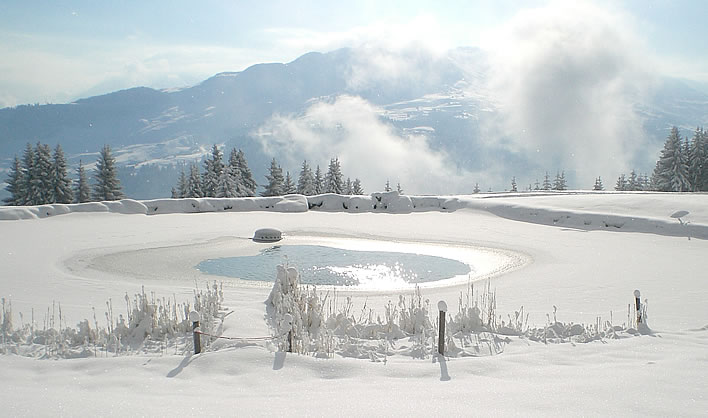
It's a challenge. Let's just jump into the cold alpine pool, edged with snow, white peaks in its mirror. We can talk later in the warm cabin when our teeth have stopped rattling. Feeling brave? Off we go then. Stay in the water till the end, don't cheat, read it all s∙l∙o∙w∙l∙y:
Igl lāresch
Las gūglias
lōmas
digl lāresch
èn mēnlas.
Rādis dorōs
glīschan
trānter groūas
ştānclas.
Aīnten igl mēştgel
crōda
igl şmarvēgl
dālla stād––
Peder Cadotsch (1922-2002): 'Igl laresch' in Anc sgolan las ronslas (1992).
Hover the cursor over a line to see an explanatory tooltip. Long, stressed vowels are marked with a macron, ¯, for diphthongs the mark is on the second vowel; all 'r's are rolled; Ş and ş are pronounced 'tg', a kind of voiced Sean Connery 'sch'.
Have a crack at reciting it aloud, roll the 'r's ostentatiously and stretch the long vowels, then listen to a native speaker do it properly. It should not surprise us that the poets of the Rumantscheia like to pull out all the stops of their euphonic language:
With thanks to Rita Uffer, Savognin, for the recording and for much helpful advice on this poem.
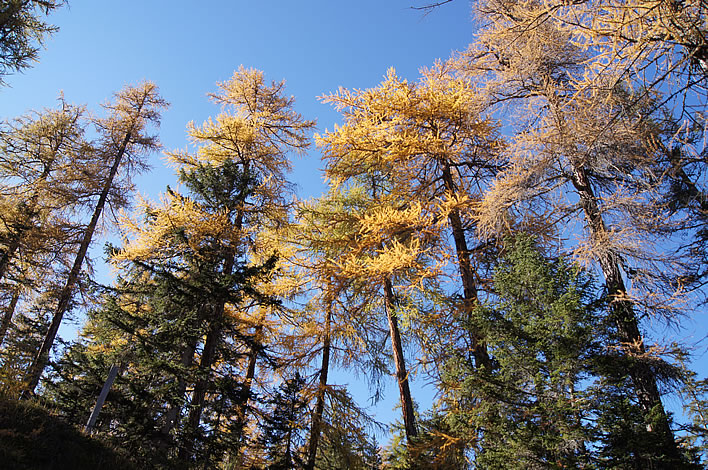
For those weak-willed ones who skipped the pool and went straight back to the warmth of the cabin, here's the easy-reading translation:
The soft needles of the larch are yellow.
Golden rays shine through the tired, thin branches.
Upon the moss falls the marvel of the summer.
'But what', chirp the cowards who chose not to spring into the pool with us, 'what does it mean?'
Your author has his own ideas, as do the other lunatics who braved the plunge – and those ideas will probably all be different.
The straightforward platitudes contained in doggerel such as Wordsworth's I Wandered Lonely as a Cloud we can all agree on. That's why they are doggerel – tame and tailwagging.
Hardier poets delight in the resonance of language and the stimulation, the Denksport of ambiguity. Their waters may be challenging, but unlike the lukewarm squish of doggerel, they get the imaginative juices flowing. Their readers are required to take a position and thus to risk an individual assessment.
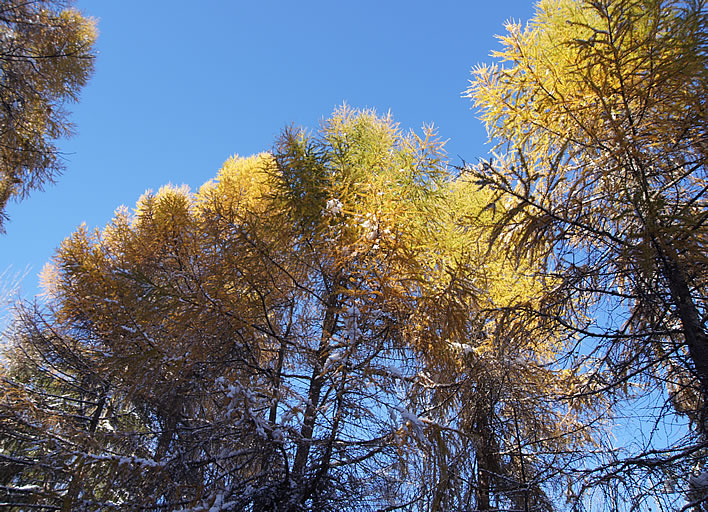
Cadotsch was born in Bonaduz but grew up and went to school in Savognin, where he absorbed the Surmiran idiom of rumantsch.
Rumantsch is one of the generic terms for the language still used widely in Canton Graubünden and as such is one of the four official languages of Switzerland.
We lazily write 'language' in the singular, but in fact rumantsch consists of five 'idioms' – a crazed Venn diagram of orthographic and pronunciation variants which, unlike the other 'high' languages of Europe, never got beaten into a single language by the Protestant translators of the Bible or the grammarians of the Enlightenment.
Each of these idioms in turn has its own seemingly erratic internal diversity. The Surmiran idiom is a major offender in this respect: the pronunciation of the idiom in my village is appreciably different from that in the village three kilometres to the north. A few kilometres further on and you might think you had arrived in ultima Thule (Val Alvra in the local tongue).
By some miracle – 'let us speak of the osmosis of persons' [©Ezra Pound, C29/143] – if you put a dozen rumantsch speakers from various localities in a room they will all understand each other more or less perfectly. It may to the outsider sound like a washing machine, but then, that's a pretty good definition of an outsider.
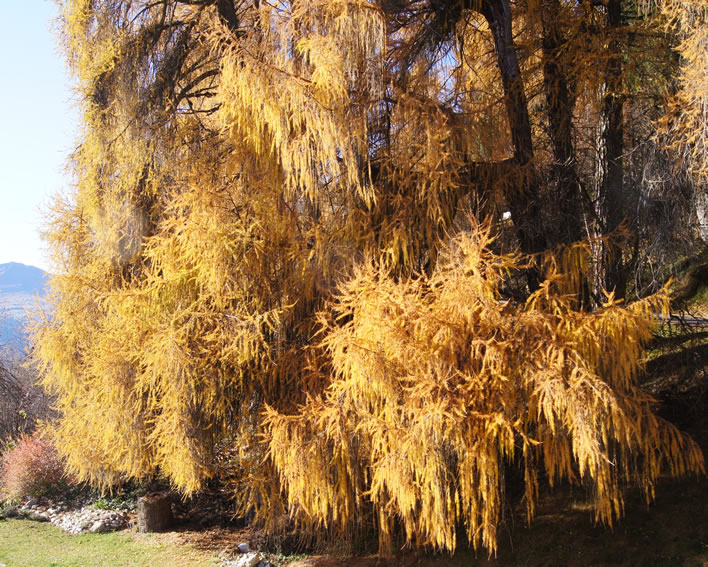
When, for example, Cadotsch uses the word menla for 'yellow', he is feeding from his Surmiran roots. Some of his compatriots may prefer melna. The heated discussion of which of these is the metathetic transformation of the other could start a bar fight. However a large number of other speakers of the amazing technicolor dreamcoat that is rumantsch would prefer the word mellen, which is the de facto headword for its immense, thirteen page entry in the Dicziunari Rumantsch Grischun (DRG).
If we lift the stone marked loma, 'soft', the DRG gives us a range of phonetic variants reminiscent of a Jackson Pollock painting. That's how it was in German and English before Luther and Wycliffe took language matters into their hands. All these variants may approximate the same, generic word, but they are spoken and written in many different ways.
The reader will not be surprised to learn that in over a century of scribbled drudgery documenting the wild ways of the Rumantscheia, the authors of this blockbuster have just arrived at the first part of 'M'. Another two hundred years (that monster 'S' is still to come) and they will have cracked it… perhaps. Whether there will be any native speakers or rumantsch scholars around then is another question: Igl futur stat scretg ainten las steilas [scretg, written, steilas, stars – the DRG will get to these two sometime].
Murphy's Law is valid everywhere and for all time, so that the word for which we really need the advice of the DRG, smarvegl – well, that advice won't be there for about a century. In the meantime we have to do the best we can with a hint under curvien, which is the word used elsewhere in the venn diagram that is rumantsch.
Smarvegl is the word that is the crux of the poem. The basic meaning is, the DRG says, 'Erstaunen, Befremden, Verwunderung', or, as Langenscheidt's excellent German-English dictionary puts it: 'surprise, amazement, astonishment', 'surprise, astonishment' and 'surprise, astonishment, amazement'. 'Perm any 3 from 8' as the football pools fans used to say.
The German words do not all mean the same thing, of course, but their nuances evade the quick lookup, just as Cadotsch's choice of the word smarvegl astonishes the reader. Nor can we overlook the other hint that the DRG gives us: far curvien, ‘sich über etwas wundern’, literally in rumantsch to 'make wonder'.
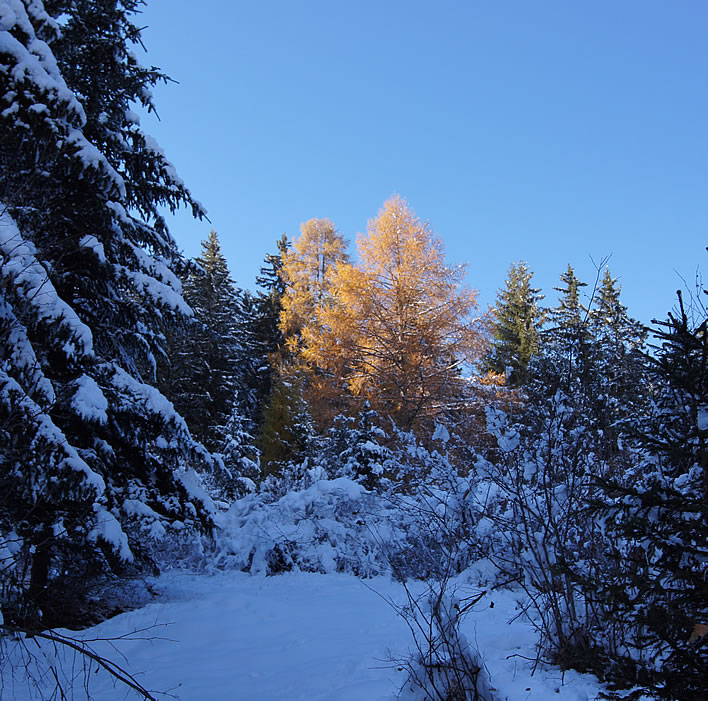
Cadotsch's polyvalent closing phrase igl smarvegl dalla stad wraps up all these nuances, layers and tensions: the summer is astonished, its glory now strewn on the moss; it is astonished also over that fact the observer is also astonished and so on and so forth. The receptive reader can fill in all the blanks according to taste.
The theme of astonishment is a big one, one that most good writers have to confront sooner or later. We scratched the surface a little nearly six years ago in our piece on the fine art of wonderment.
Cadotsch is an author who clearly enjoys the acoustic possibilities of his native tongue, as do his many readers ('many' being a term of art in this context, given that in this sparsely populated region it might sometimes mean 'three'):
Las gūglias
lōmas
digl lāresch
èn mēnlas
A glance shows us why menlas was a much better option than mellen.
The line breaks are not affectation. For example, the reader's attention is brought to the thread of single words that runs through the poem:
lomas [soft]–glischan [shine]–croda [falls]
Furthermore, the short lines slow the reader down, the words are no longer lost among their fellows but the reader is invited to consider them singly and give them the level of attention – the astonishment, if you will – that is their due.
Note, too, that Cadotsch has avoided rhyme. Rumantsch has a very limited variety of word endings which, like Italian, make rhyming far too easy, except in very short lines such as these. He writes rhymed verse from time to time but here rhymes would have ruined everything.
Now, in deepest winter here in the mountains, the larches are bare, their soft needles, the astonishment of the summer, are softening and disintegrating on the mosses deep under the snow. We visited them last autumn; perhaps in spring we'll check up on them again, looking for the pale green astonishment that will come.
0 Comments UTC Loaded:
Input rules for comments: No HTML, no images. Comments can be nested to a depth of eight. Surround a long quotation with curly braces: {blockquote}. Well-formed URLs will be rendered as links automatically. Do not click on links unless you are confident that they are safe. You have been warned!